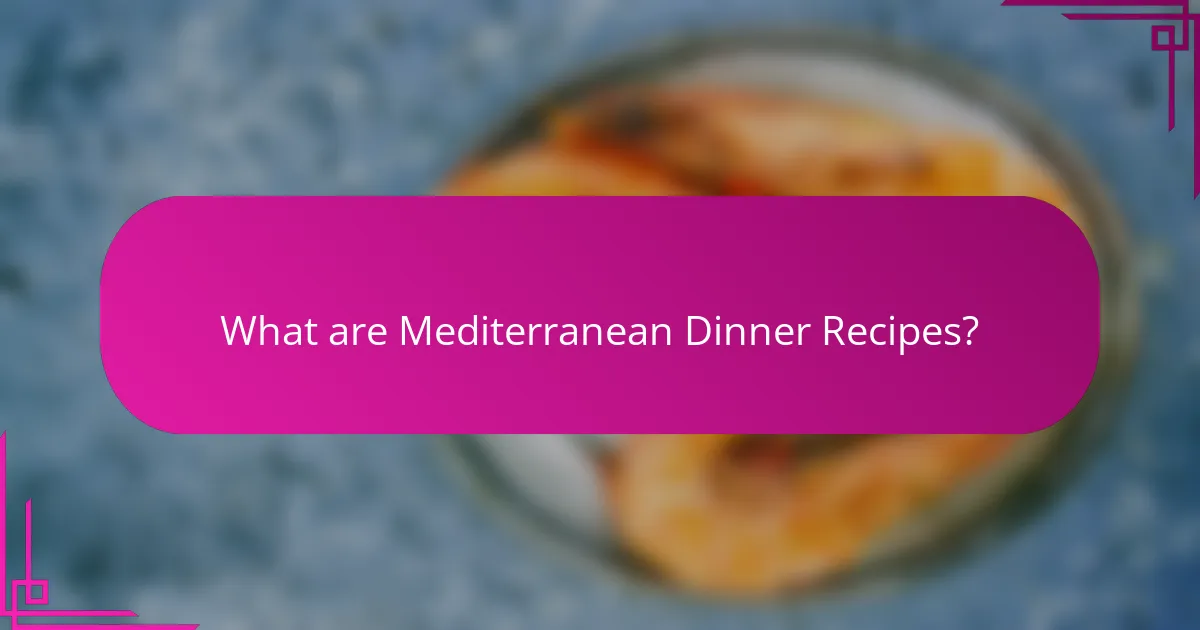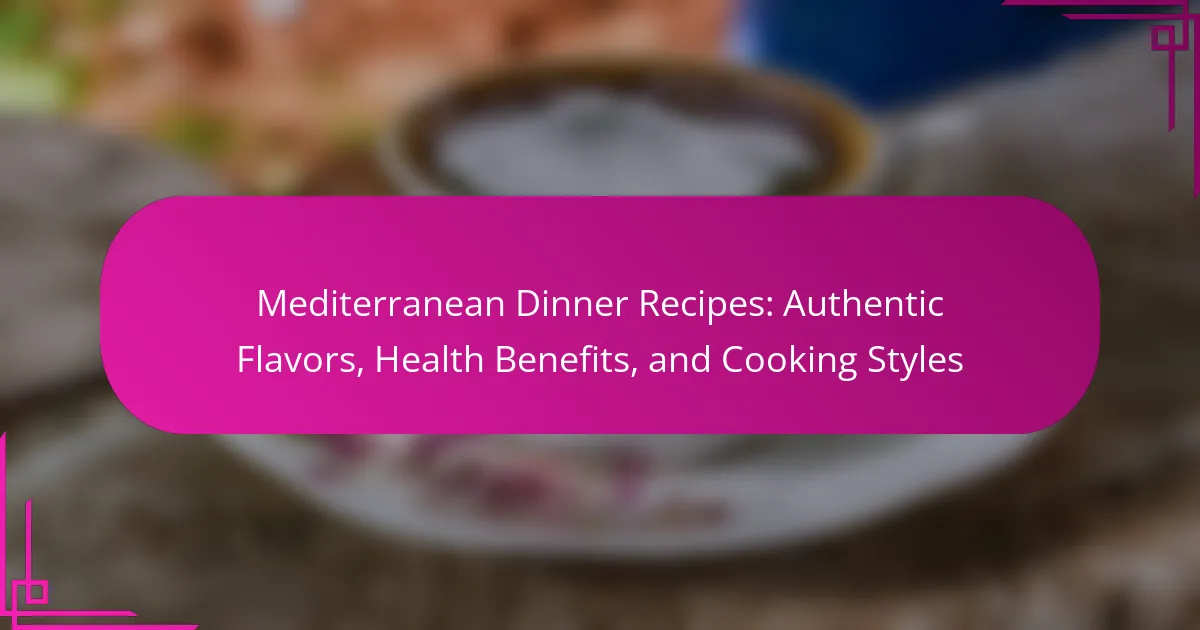Mediterranean dinner recipes are dishes inspired by the diverse culinary traditions of countries bordering the Mediterranean Sea, emphasizing healthy ingredients such as olive oil, fresh vegetables, whole grains, legumes, and seafood. Popular dishes include Greek moussaka, Italian risotto, and Spanish paella, each showcasing unique flavors and preparation methods. The Mediterranean diet is known for its health benefits, including a reduced risk of chronic diseases, while promoting the use of fresh, high-quality ingredients and traditional cooking techniques like grilling and roasting. This cuisine celebrates the natural taste of ingredients, making meals both nutritious and satisfying.

What are Mediterranean Dinner Recipes?
Mediterranean dinner recipes are dishes inspired by the culinary traditions of countries bordering the Mediterranean Sea. These recipes often feature ingredients like olive oil, fresh vegetables, whole grains, legumes, and seafood. Common dishes include Greek salad, pasta with pesto, and grilled fish. The cuisine emphasizes healthy fats and seasonal produce. Studies show that Mediterranean diets can lower the risk of chronic diseases. The Mediterranean diet is recognized for its balance and flavor. This culinary style promotes both health and enjoyment in meals.
How do Mediterranean Dinner Recipes reflect cultural diversity?
Mediterranean dinner recipes reflect cultural diversity through their incorporation of various regional ingredients and cooking techniques. Each Mediterranean country has unique flavors influenced by its history and geography. For example, Italian dishes often feature tomatoes and basil, while Greek recipes highlight olive oil and feta cheese. The use of spices varies widely; North African cuisines incorporate cumin and coriander, while Middle Eastern dishes may use sumac and za’atar. Additionally, shared culinary traditions, such as meze in Lebanon and tapas in Spain, showcase communal dining practices. Historical trade routes facilitated the exchange of ingredients, further enriching these recipes. This blend of cultural influences results in a vibrant culinary landscape that celebrates diversity.
What ingredients are commonly used in Mediterranean cuisine?
Common ingredients in Mediterranean cuisine include olive oil, tomatoes, garlic, and herbs. Olive oil is a staple fat used in cooking and dressings. Tomatoes are often used fresh or in sauces. Garlic adds flavor to many dishes. Herbs like basil, oregano, and parsley enhance the taste of meals. Legumes, such as lentils and chickpeas, are also prevalent. Whole grains, including rice and couscous, provide essential carbohydrates. Fish and seafood are frequently featured in Mediterranean diets. These ingredients contribute to the health benefits associated with this cuisine, such as reduced risk of heart disease.
How do regional variations influence Mediterranean Dinner Recipes?
Regional variations significantly influence Mediterranean dinner recipes through diverse ingredients and cooking techniques. Each Mediterranean country and region boasts unique local produce, spices, and culinary traditions. For instance, Italian recipes often feature tomatoes and basil, while Greek dishes may emphasize olives and feta cheese.
The climate and geography of each region shape available ingredients. Coastal areas provide seafood, while inland regions focus on meats and grains. Historical trade routes also introduced new flavors, enriching local cuisines.
Moreover, cultural practices and religious beliefs impact meal preparation and consumption. For example, during Lent, many Mediterranean cultures adopt vegetarian recipes. This variety results in a rich tapestry of flavors and styles across Mediterranean dinner recipes, showcasing the region’s culinary diversity.
What are the key characteristics of Mediterranean Dinner Recipes?
Mediterranean dinner recipes are characterized by their emphasis on fresh ingredients and bold flavors. These recipes often feature vegetables, legumes, whole grains, and healthy fats, particularly olive oil. Herbs and spices, such as oregano, basil, and garlic, are commonly used to enhance taste. Seafood and lean proteins, such as chicken and lamb, are frequently included. Whole foods are prioritized over processed ingredients. Many dishes are prepared using simple cooking methods like grilling or roasting. The Mediterranean diet is also known for its health benefits, including heart health and weight management. Studies show that this diet can reduce the risk of chronic diseases, supporting its popularity.
How do flavors and aromas define Mediterranean cooking?
Flavors and aromas are central to Mediterranean cooking. They create a rich sensory experience that defines the cuisine. Fresh herbs like basil, oregano, and rosemary contribute to the vibrant taste. Olive oil is a staple, providing depth and richness. Citrus fruits add brightness and acidity, enhancing dishes. Garlic is frequently used, imparting a robust flavor. Spices such as cumin and coriander enrich the aroma profile. Seasonal ingredients reflect the region’s agricultural diversity. Together, these elements create a distinctive culinary identity that is celebrated worldwide.
What cooking techniques are prevalent in Mediterranean cuisine?
Mediterranean cuisine employs several prevalent cooking techniques. These techniques include grilling, roasting, sautéing, and braising. Grilling is common due to the region’s emphasis on fresh meats and vegetables. Roasting enhances the natural flavors of ingredients, often using olive oil and herbs. Sautéing allows for quick cooking while preserving the texture and taste of vegetables. Braising combines moist and dry heat, making it ideal for tougher cuts of meat. These techniques contribute to the healthy and flavorful profile of Mediterranean dishes. The use of fresh ingredients is a hallmark of this cuisine, which further enhances the effectiveness of these cooking methods.
What health benefits are associated with Mediterranean Dinner Recipes?
Mediterranean dinner recipes are associated with numerous health benefits. They promote heart health due to their high content of healthy fats, particularly olive oil. These recipes often include a variety of fruits, vegetables, and whole grains, which contribute to improved digestion. Studies indicate that adherence to a Mediterranean diet can reduce the risk of chronic diseases, including type 2 diabetes and certain cancers. The diet is also linked to better cognitive function and a lower risk of Alzheimer’s disease. Additionally, Mediterranean meals are rich in antioxidants, which help combat inflammation. Overall, these recipes support a balanced and nutritious lifestyle.
How do these recipes contribute to heart health?
Mediterranean dinner recipes contribute to heart health by emphasizing ingredients that lower cholesterol and blood pressure. These recipes often include healthy fats, such as olive oil, which is rich in monounsaturated fats. Studies show that monounsaturated fats can reduce the risk of heart disease. Additionally, these recipes frequently feature fruits, vegetables, and whole grains. These foods are high in fiber, which helps maintain healthy cholesterol levels. The Mediterranean diet also includes fish, which is a source of omega-3 fatty acids. Omega-3s are known to improve heart health by reducing inflammation and lowering triglycerides. Furthermore, the use of herbs and spices instead of salt reduces sodium intake, promoting better blood pressure control. Overall, the combination of these elements supports cardiovascular health effectively.
What role do antioxidants play in Mediterranean ingredients?
Antioxidants in Mediterranean ingredients play a crucial role in promoting health. They help neutralize free radicals, which can cause cellular damage. Common Mediterranean ingredients like olive oil, tomatoes, and red wine are rich in antioxidants. For instance, olive oil contains oleocanthal, known for its anti-inflammatory properties. Tomatoes are high in lycopene, linked to reduced risk of certain cancers. Red wine offers resveratrol, which may improve heart health. Studies show that diets rich in these antioxidants can lower the risk of chronic diseases. The Mediterranean diet emphasizes these ingredients, contributing to its reputation for health benefits.
How can Mediterranean Dinner Recipes be adapted for modern diets?
Mediterranean dinner recipes can be adapted for modern diets by incorporating healthier ingredients and alternative cooking methods. For example, traditional pasta can be replaced with whole grain or legume-based pasta. This modification increases fiber content and nutritional value. Additionally, using olive oil instead of butter aligns with modern health guidelines emphasizing healthy fats.
Reducing portion sizes while maintaining flavor can also be effective. Utilizing herbs and spices enhances taste without added calories. Incorporating more plant-based proteins, such as lentils and chickpeas, caters to vegetarian and vegan diets.
Furthermore, adapting recipes for gluten-free diets is possible by using alternatives like quinoa or brown rice. Many Mediterranean dishes naturally align with low-carb diets, as they emphasize vegetables and lean proteins. These adaptations ensure Mediterranean recipes remain relevant and accessible for contemporary dietary needs.
What are some vegetarian or vegan Mediterranean options?
Vegetarian and vegan Mediterranean options include dishes like falafel, hummus, tabbouleh, and stuffed grape leaves. Falafel is made from ground chickpeas and spices, often served in pita bread. Hummus is a spread made from blended chickpeas, tahini, olive oil, and lemon juice. Tabbouleh is a salad featuring parsley, bulgur, tomatoes, and mint. Stuffed grape leaves, known as dolmas, are filled with rice, herbs, and spices. These dishes highlight the rich flavors and healthy ingredients typical of Mediterranean cuisine. They are widely recognized for their nutritional benefits, including high fiber and healthy fats.
How can Mediterranean recipes be modified for gluten-free diets?
Mediterranean recipes can be modified for gluten-free diets by substituting traditional grains with gluten-free options. For example, replace wheat pasta with rice or quinoa pasta. Use gluten-free bread or wraps instead of regular bread for sandwiches or wraps. Incorporate more vegetables and legumes, such as chickpeas and lentils, to maintain protein content. Utilize gluten-free flours, like almond or coconut flour, for baking. When using sauces, ensure they are gluten-free by avoiding soy sauce or other gluten-containing ingredients. Many Mediterranean dishes, like salads and grilled meats, are naturally gluten-free and can be enjoyed as is. These modifications allow adherence to gluten-free diets while preserving Mediterranean flavors.

What are some popular Mediterranean Dinner Recipes?
Popular Mediterranean dinner recipes include dishes like Greek moussaka, Italian risotto, and Spanish paella. Greek moussaka features layers of eggplant, ground meat, and béchamel sauce. Italian risotto is a creamy rice dish often made with arborio rice and flavored with broth. Spanish paella combines rice with saffron, vegetables, and seafood or meat. Other favorites are tabbouleh, a refreshing salad made with parsley and bulgur, and falafel, which are deep-fried chickpea balls served with tahini sauce. These recipes showcase the diverse flavors and ingredients typical of Mediterranean cuisine.
How can I prepare classic Mediterranean dishes at home?
To prepare classic Mediterranean dishes at home, start by selecting authentic recipes. Popular options include dishes like hummus, tabbouleh, and moussaka. Gather fresh ingredients such as olive oil, garlic, tomatoes, and herbs like oregano and basil. Use whole grains like bulgur or quinoa for salads. Follow traditional cooking methods, such as grilling or roasting, to enhance flavors. Adjust seasoning with spices like cumin and paprika for authenticity. Many Mediterranean dishes are simple, requiring minimal cooking time. Cooking techniques often emphasize freshness and quality of ingredients. For example, fresh vegetables should be used for salads to maintain crispness.
What ingredients do I need for a traditional Greek salad?
A traditional Greek salad requires tomatoes, cucumbers, red onion, bell peppers, Kalamata olives, and feta cheese. These ingredients create a refreshing and flavorful dish. Tomatoes provide juiciness and acidity. Cucumbers add crunch and hydration. Red onion contributes sharpness. Bell peppers offer sweetness and color. Kalamata olives introduce a briny flavor. Feta cheese adds creaminess and tang. This combination reflects authentic Greek cuisine, known for its emphasis on fresh, high-quality ingredients.
How do I make a flavorful Moroccan tagine?
To make a flavorful Moroccan tagine, start by selecting your main ingredients. Common choices include chicken, lamb, or vegetables. Next, season the meat or vegetables with spices such as cumin, coriander, cinnamon, and saffron. Heat olive oil in the tagine or a heavy pot, then brown the meat to enhance its flavor. After browning, add chopped onions, garlic, and ginger for depth. Incorporate dried fruits like apricots or raisins for sweetness. Pour in broth or water to create a rich sauce. Cover and cook on low heat for at least one hour to allow flavors to meld. Serve the tagine over couscous or with bread to soak up the sauce. This traditional cooking method captures the essence of Moroccan cuisine.
What are some quick Mediterranean Dinner Recipes for busy weeknights?
Quick Mediterranean dinner recipes for busy weeknights include dishes like Greek salad with grilled chicken, lemon garlic shrimp with quinoa, and Mediterranean vegetable stir-fry. Greek salad combines fresh vegetables, feta cheese, and olives, providing a refreshing meal. Lemon garlic shrimp cooks in under 15 minutes and pairs well with quinoa for added protein. Mediterranean vegetable stir-fry utilizes seasonal veggies and can be prepared in just 20 minutes. These recipes are not only quick but also highlight the vibrant flavors characteristic of Mediterranean cuisine.
How can I prepare a Mediterranean-inspired pasta in under 30 minutes?
Boil pasta according to package instructions for about 8-10 minutes. While the pasta cooks, heat olive oil in a pan over medium heat. Add minced garlic and sauté for 1-2 minutes until fragrant. Incorporate diced tomatoes and spinach into the pan. Cook for another 3-4 minutes until the spinach wilts. Drain the pasta and add it to the pan. Mix in feta cheese and olives. Season with salt, pepper, and oregano to taste. Serve immediately for a quick Mediterranean-inspired meal.
What are some one-pan Mediterranean meals for easy cleanup?
One-pan Mediterranean meals for easy cleanup include dishes like Mediterranean chicken and vegetables, shrimp and orzo, and ratatouille. Mediterranean chicken and vegetables combine seasoned chicken thighs with bell peppers, olives, and zucchini, all cooked in one pan. Shrimp and orzo feature shrimp sautéed with garlic and spinach, mixed with orzo pasta, and baked together. Ratatouille is a vegetable medley of eggplant, zucchini, and tomatoes, roasted in a single dish. These meals minimize cleanup by using one cooking vessel for preparation and cooking.

What tips can enhance my Mediterranean cooking experience?
Use fresh, high-quality ingredients to enhance Mediterranean cooking. Fresh vegetables, herbs, and olive oil are essential. Incorporate seasonal produce for optimal flavor. Experiment with herbs like oregano, basil, and thyme for authenticity. Utilize traditional cooking methods such as grilling and roasting. These techniques preserve flavors and nutrients. Pair dishes with complementary sides like hummus or tzatziki. This adds variety and enhances the meal experience. Embrace simplicity; Mediterranean cuisine often highlights the natural taste of ingredients. This approach leads to healthier and more satisfying meals.
How can I select the best ingredients for Mediterranean recipes?
To select the best ingredients for Mediterranean recipes, prioritize fresh, high-quality produce. Choose seasonal fruits and vegetables like tomatoes, eggplants, and bell peppers for optimal flavor. Look for extra virgin olive oil, known for its health benefits and rich taste. Incorporate fresh herbs such as basil, oregano, and parsley to enhance dishes. Select whole grains like farro or bulgur for added nutrition. Choose high-quality proteins, including fish and lean meats, to align with Mediterranean dietary principles. Opt for local cheeses like feta or ricotta for authenticity. Research indicates that these ingredients contribute to the health benefits associated with the Mediterranean diet, such as lower risks of heart disease (source: Mediterranean Diet and Health Outcomes, Estruch et al., 2018).
What should I look for when choosing olive oil?
Look for extra virgin olive oil when choosing olive oil. Extra virgin olive oil is the highest quality and most flavorful type available. It is made from pure, cold-pressed olives without any refining. Check for a harvest date on the label to ensure freshness. A recent harvest date indicates better flavor and nutritional value. Look for dark glass or tin packaging, which protects the oil from light and oxidation. Consider the country of origin, as oils from regions like Italy or Spain are often more reputable. Finally, review the flavor profile; a good olive oil should have a balance of fruitiness, bitterness, and spiciness.
How does freshness impact the flavor of Mediterranean dishes?
Freshness significantly enhances the flavor of Mediterranean dishes. Fresh ingredients provide vibrant aromas and tastes, which are essential in Mediterranean cuisine. For example, fresh herbs like basil and parsley release essential oils that contribute to the dish’s overall flavor profile. Additionally, fresh vegetables retain their natural sweetness and crunch, improving texture and taste. Studies show that fresh produce contains higher levels of nutrients and flavor compounds compared to older counterparts. Therefore, using fresh ingredients is crucial for achieving the authentic flavors characteristic of Mediterranean cooking.
What common mistakes should I avoid when cooking Mediterranean meals?
Common mistakes to avoid when cooking Mediterranean meals include using low-quality olive oil. High-quality extra virgin olive oil enhances flavor and health benefits. Another mistake is overcooking vegetables. Mediterranean cuisine emphasizes fresh, crisp vegetables for texture and taste. Not seasoning adequately is also a frequent error. Proper seasoning with herbs and spices is essential for authentic flavors. Additionally, neglecting to balance flavors can lead to bland dishes. Mediterranean meals should have a harmonious blend of salty, sweet, and sour elements. Lastly, using processed ingredients instead of fresh ones diminishes the meal’s authenticity. Fresh, seasonal ingredients are a hallmark of Mediterranean cooking.
How can overcooking affect the taste of Mediterranean dishes?
Overcooking can significantly diminish the taste of Mediterranean dishes. This cuisine often relies on fresh ingredients and delicate flavors. When overcooked, vegetables can become mushy and lose their vibrant taste. Proteins like fish or chicken can dry out, leading to a bland texture. Herbs and spices, essential for Mediterranean flavors, can lose their potency when exposed to excessive heat. For example, garlic can turn bitter if cooked too long. Additionally, overcooking can alter the intended balance of flavors in dishes like ratatouille or paella. The resulting dish may lack the freshness and complexity that characterize Mediterranean cooking.
What are the pitfalls of using non-authentic ingredients?
Using non-authentic ingredients can lead to diminished flavor and nutritional value. Authentic ingredients are crucial for achieving the true essence of Mediterranean cuisine. Non-authentic substitutes often lack the unique taste profiles and aromatic qualities that define traditional dishes. This can result in bland meals that fail to satisfy culinary expectations. Additionally, using non-authentic ingredients may compromise health benefits associated with traditional recipes. For example, authentic olive oil is rich in healthy fats, while substitutes may be lower in quality. Furthermore, reliance on non-authentic ingredients can erode cultural heritage and culinary knowledge. Authentic Mediterranean cooking emphasizes the importance of local sourcing and seasonal produce. By using non-authentic ingredients, one may miss out on the rich history and traditions behind each dish.
What are some best practices for serving Mediterranean Dinner Recipes?
Serve Mediterranean dinner recipes on a variety of plates to enhance presentation. Using colorful dishes highlights the vibrant ingredients typical of Mediterranean cuisine. Incorporate fresh herbs as garnishes for added flavor and visual appeal. Serve dishes family-style to encourage sharing and social interaction, which is a key aspect of Mediterranean dining culture. Pair meals with appropriate beverages, such as red wine or herbal teas, to complement the flavors. Offer a selection of bread, like pita or focaccia, for guests to enjoy with dips and spreads. Ensure that all dishes are served at the correct temperature to enhance taste and enjoyment. Finally, consider dietary restrictions by providing vegetarian or gluten-free options, as Mediterranean diets often include a variety of plant-based foods.
How should I present Mediterranean dishes for a dinner party?
Present Mediterranean dishes on elegant platters for a visually appealing display. Use colorful ingredients like fresh vegetables, olives, and herbs to enhance the presentation. Arrange dishes in a way that encourages sharing, such as mezze-style serving. Incorporate traditional serving utensils to maintain authenticity. Garnish plates with fresh herbs or citrus for added color and flavor. Ensure that each dish is labeled for easy identification. Maintain a cohesive theme with complementary colors and styles. This approach creates an inviting atmosphere for guests to enjoy the meal.
What are some complementary side dishes to serve with Mediterranean meals?
Complementary side dishes to serve with Mediterranean meals include tzatziki, hummus, and tabbouleh. Tzatziki is a yogurt-based dip that pairs well with grilled meats. Hummus, made from chickpeas, is a versatile spread enjoyed with pita bread. Tabbouleh is a refreshing salad made with parsley, tomatoes, and bulgur wheat. Additionally, roasted vegetables enhance the meal’s flavor profile. Greek salad, featuring cucumbers and feta cheese, adds a crunchy texture. These sides are commonly found in Mediterranean cuisine, providing balance and variety to the main dishes.
Mediterranean Dinner Recipes encompass a variety of dishes inspired by the culinary traditions of countries bordering the Mediterranean Sea, featuring ingredients such as olive oil, fresh vegetables, whole grains, legumes, and seafood. These recipes reflect cultural diversity through regional variations, highlighting unique flavors and cooking techniques. The cuisine is characterized by its emphasis on fresh ingredients, bold flavors, and health benefits, including improved heart health and reduced risk of chronic diseases. Additionally, Mediterranean recipes can be adapted for modern diets, including vegetarian, vegan, and gluten-free options, while maintaining their authentic taste and nutritional value. Popular dishes include Greek moussaka, Italian risotto, and Spanish paella, showcasing the rich culinary heritage of the Mediterranean region.
